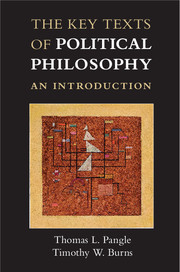Book contents
- Frontmatter
- Dedication
- Contents
- Acknowledgments
- Introduction
- Part I Classical Political Philosophy
- Part II Biblical Political Theology
- Part III Modern Political Philosophy
- 6 Machiavelli’s Discourses and Prince
- 7 Bacon’s New Atlantis
- 8 Hobbes’s Leviathan
- 9 Locke’s Second Treatise of Government
- 10 Montesquieu’s Spirit of the Laws
- Part IV Modernity in Question
- Name Index
- Subject Index
- References
9 - Locke’s Second Treatise of Government
Published online by Cambridge University Press: 05 October 2014
- Frontmatter
- Dedication
- Contents
- Acknowledgments
- Introduction
- Part I Classical Political Philosophy
- Part II Biblical Political Theology
- Part III Modern Political Philosophy
- 6 Machiavelli’s Discourses and Prince
- 7 Bacon’s New Atlantis
- 8 Hobbes’s Leviathan
- 9 Locke’s Second Treatise of Government
- 10 Montesquieu’s Spirit of the Laws
- Part IV Modernity in Question
- Name Index
- Subject Index
- References
Summary
In moving from Hobbes to John Locke (1632–1704), we follow a key development within modern political philosophy, entailing the qualified acceptance of the fundamental principles of human nature as articulated by Hobbes, but accompanied by a severe criticism, and rejection, of the way Hobbes implemented those principles in his prescriptions for government. Locke argues that Hobbes has not adequately recognized how easily government itself can become a threat to security and peace – a threat far graver than the threats from groups and individuals in the state of nature. For government has at its disposal more terrible power than is possessed by any individual or group in the state of nature. That terrible power can be abused by the humans who wield it, unless the “mighty Leviathan” (sec. 98) is itself restrained, from within, by some system of checks and balances. Locke took Hobbes’s basic theoretical foundation (the new conception of human nature as extremely dangerous) and argued for building on that foundation a different and safer governmental structure. Locke thus set the agenda for the modern tradition of liberal constitutionalism, constitution framing, and constitutional law. (At the same time, we must not forget that the purer Hobbesian tradition, or what one might call the statist, or authoritarian, rights tradition, has always continued to have deep influence and leading exemplars – such as Napoleon in France; Bismarck in Germany; Atatürk in Turkey; and Putin in Russia.)
Locke’s Rhetorical Genius
With this bird’s-eye view of how Locke departs most obviously from Hobbes, we are almost prepared to turn to Locke’s Second Treatise. But if we are going to understand Locke’s writing – whose true message is more difficult of access than is Hobbes’s – we have to begin by focusing in on an important disagreement Locke has with Hobbes concerning human nature. According to Hobbes, fear – anxiety about security – is the passion that is to be counted upon and built upon. Fear is the passion that can become reasonable, that can link up with and be guided by reason, and can therefore form the basis for a minimal but solid justice. Locke finds this insufficient.
- Type
- Chapter
- Information
- The Key Texts of Political PhilosophyAn Introduction, pp. 276 - 306Publisher: Cambridge University PressPrint publication year: 2014
References
- 1
- Cited by

